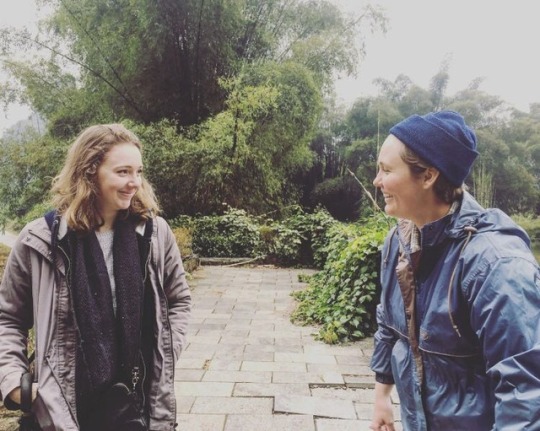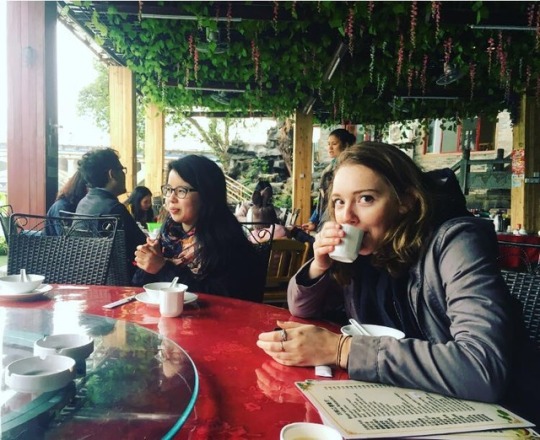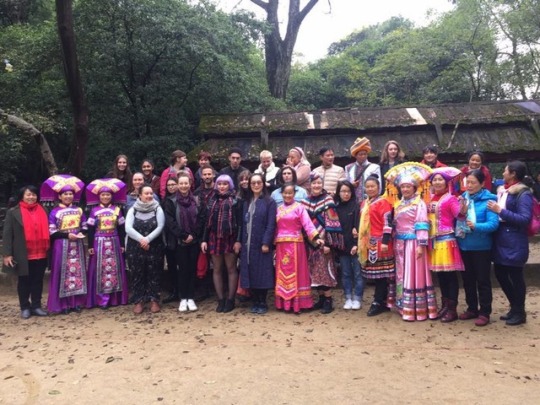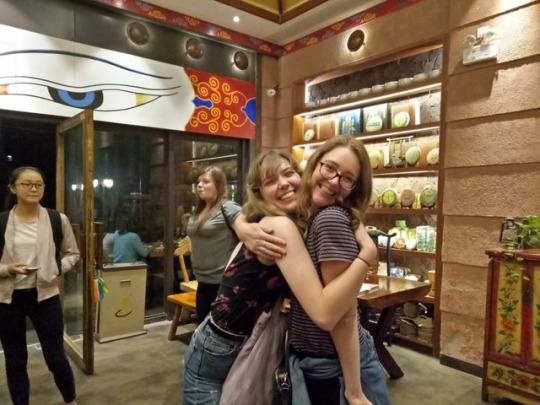Text
-31 days and counting
“
vimeo
This blog is haphazard. It is fragments of thoughts, very often interrupted by other thoughts. It is a mix of forms, lists and sounds. It represents me and it reflects the trip.
The video with this post are my seconds. In my post “one second” I talk about this new app I’ve downloaded. I express that “this app is kind of a daily journal, a life story that I might only keep for a few months, but at least it’s a few months I will remember. What I am excited about is being able to capture a few seconds of our trip to China, which moments will I choose? who will feature in them? this is all relevant if I am still using the app of course.”
I could explain all the seconds but I think they speak for themselves. Instead I’ll share my experience of the whole semester.
I remember applying for the class and contemplating what it would be like to travel with a bunch of writers, some of whom I barely knew. I was nervous but applied anyway. My reasoning was that it was so long away that I had all this time to prepare. Instead I watched the counter on my blog go down and my anxiety of the trip grow. The counter haunted me a little bit, a ticking time bomb that literally beeped at me when it got down to 0 days. But it reminded me that time comes and it goes and this trip would be over and I’d have amazing memories to share on my blog and with my friends and family. I didn’t know the counter could do what it is doing and go into the negative but I like it. It makes me think back to -31 days ago when I was nervously waiting for my train to take me to Southern Cross and how much has changed during this month. I think in a way all my posts have been guided by this counter. I mention it frequently in my series of list posts and use it as starting point for my thoughts. However, when travelling, time is thrown out the window. The days blend together and I am quick to remind myself the number of days till I have to leave, trying to make the most of it. This blog has been crucial in tracking my progress through this collaboration class. So much time has passed since I first heard about the trip and how lucky I am to have a place where I documented my first thoughts.
I read back my first posts (such as Get to Know Guangzhou) and I think of how different my experience was to that research. I didn’t know what I was reading at the time, it didn’t make a whole lot of sense but I kept going. Taking in what I deemed most important. I now understand that Guangzhou is more of an industrial area due to all the times I got lost in the fabric district. I experienced the old and new, both in the culture and in the buildings, in the people and the food. I got a tour of the library that seemed to trail on forever and I definitely understand why they call Guangzhou “The Flower City”. I understand now because I’ve got memories attached to these facts, I know what I’m talking about (or at least I like to think so). I think there is only so much you can know just by researching. That an hour of research gave me the same information as 5 minutes of people watching alongside the Pearl River.
In the beginning my posts were, as Francesca stated more “matter of fact”. I knew they weren’t as personal as I wanted and were more informative about what to prepare for. She continued to write in my first assessment for meet my blog, “I’m looking forward to reading more reflection in your blog about what all of this makes you think and how travel opens you up to new experiences, especially given we are going to be introduced to China through our Chinese students’ story, and how they will be introduced to you through your stories and writing.” This made me think about what I was writing. That this blog was a live document of my experience and it should reflect that. There are some blog posts that don’t necessarily talk about China or the collaborative process explicitly but they represent my frame of mind or what I couldn’t stop thinking about while on this intercultural journey. This includes “one language dies everyday” and “that time I was afraid of Australian authors”. These blog posts are are a response to what the study tour was forcing me to think about. Different languages, cultural differences, why I write and what it means to be an Australian writer. This blog has been my frame of mind, the ebb and flow between thinking about China and thinking about the whole process.
I wrote shorter pieces about the process directly that can be seen in “editing for yourself?” and “team work makes the dream work”. This is where I gathered my thoughts on editing and the collaborative process itself. It is where I came to the conclusion that “what we are doing with these anthologies is not just showcasing intercultural writing but expanding our understanding of how to connect and communicate with others through creative writing.”
This collaborative process has been a stepping stone for me. Maybe larger than a stepping stone. A grand staircase. Working in a team has been a challenge as I am usually so comfortable working alone. But as I mention throughout my blog we are a group and after all the things that didn’t go to plan on the trip, we had to form a tight-knit team that could work towards the publication of the anthology and the almanac, to form the Branches and the Roots. In my post “I am now an editor, illustrator and typesetter... kind of”, I talk about our dream design team and how we made it work. It was a lot of extra work and it was overwhelming at times but it means that I can proudly say that I was a big part of this collaborative project. I’m pretty happy with that. I realised while writing that post that “as a writer you have to wear a few different badges. You have to be able to switch in a moments notice and see your work with fresh critical eyes.” I’ve never had the skills to be able to do that. But now I’ve got somewhere to start.
A favourite post of mine that sums up my experience of Chinese culture and intercultural friendships is “North South East West”. I met Alice who was one of my students and she talked to me about her life. Her parents, her hometown, where she ate, what her daily life was living with six other girls. I was thankful and surprised that she felt so comfortable to share her life with me. She asked me while we were walking through the campus about what my expectations were coming to China. Does Australia have Chinese stereotypes? Did us Australians expect the Chinese to all be a certain way? It was hard to answer. I think I said that I didn’t really know much about China. I only knew what I had been shown, because I hadn’t taken the time to find out for myself. This is when I realised that the Chinese Students were on a intercultural journey just as much as I was. They had foreigners come into their space and possibly make them question what their country was like in comparison to ours. In a conversation between a group of second year students and myself, we talked about why we write. One of the students named Douglas (after House of Cards) asked me if I write for myself. I thought he meant for assignments so I steered off in that direction. But it made me think in general, do I write for myself. Is this blog for myself? It all comes back to why I write. I think as a class we came to a collective answer that features through most of our blogs. Because we want to, because we feel we need to. Because we have words to share. I think this is why I called my blog With Your Words. Because you can do anything with words. Just look at what we’ve done. We’ve been to China on this whirlwind intercultural collaborative experience and our words took us there. I think this is the beauty of this whole class. That our words and our writing were able to take us on this adventure. That’s what I will remember for a long time, the power of my writing and the places it can take me.

(a final picture of me, very happily writing in the sun, taken by Taylah)
(( there are more than 5 links because I had trouble deciding, but they are split into 5 sections ))
0 notes
Photo

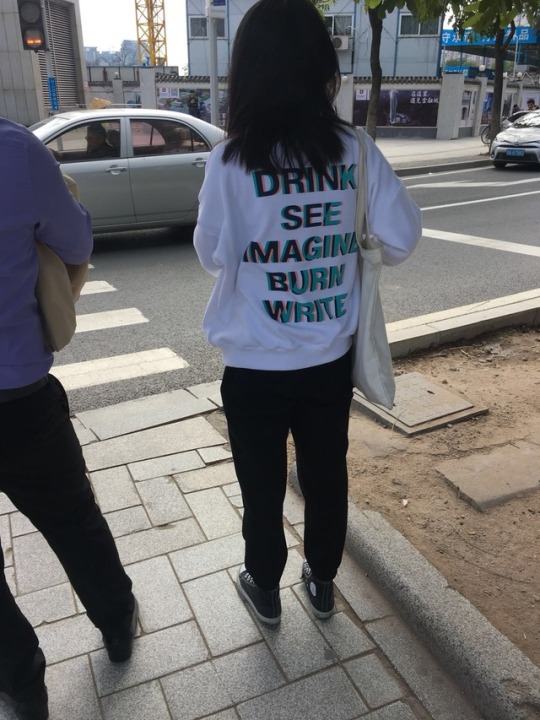

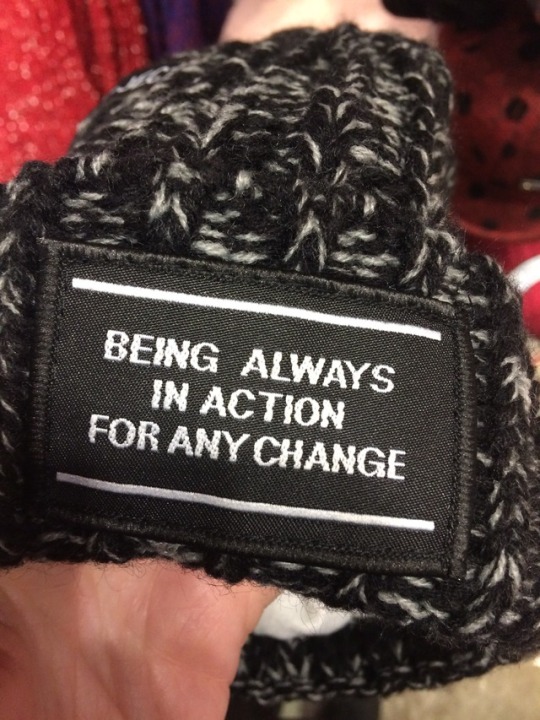

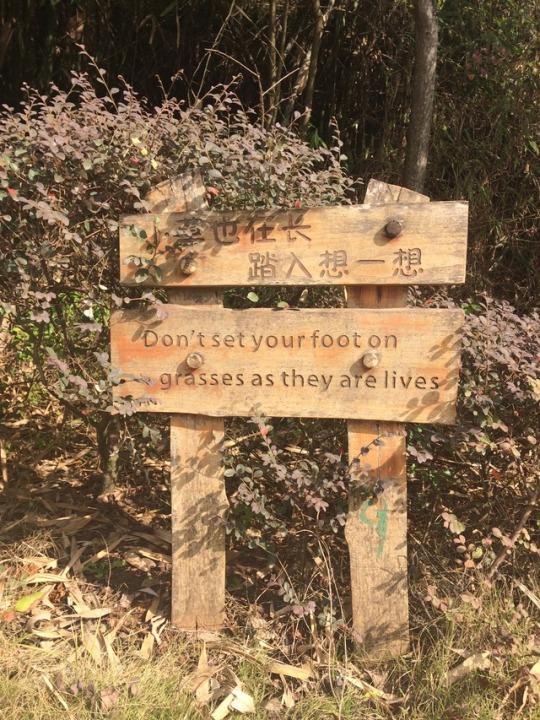
A selection of jumpers, beanies and signs that are kind of English.
1. “Let’s Smurfs (BOOM)” - photo supplied by Travis
2. “Drink See Imagine Burn White” - photo supplied by Travis
3. “Bowller Hat Trap So Dope Just The Same As Bowller - beanie in Yanshuo
4. “Being Always In Action For Any Change” - beanie in Yangshuo
5. “Walking is healthy for you” - an inspirational sign on The Scholar-Champion Trail in Yangshuo
6. “Don’t set your foot on grasses as they are lives” - a sign just before the trail
0 notes
Text
team work makes the dream work

I’ve never been one to work in groups. I’ve always preferred to take a whole task on myself and just get it done. This is what I started doing at the beginning of this collaboration studio. Even though it was meant to be collaborative I still pushed to do things alone. This didn’t work out well because we worked in groups so much that I had to change my way of thinking. I was already friends with Jess and Georgie, but often I wasn’t paired or grouped with them and it forced me to get to know other lovely people in our course.
Blogging seems to be a one person thing. I sit down and just write what I want to write. But having access to everyones blogs and reading the words of others has just improved the collaborative process and made it easier for us all as a group. We knew that everyone felt underprepared and anxious for the trip so it made things a little easier knowing we weren’t alone.
Working together in a classroom is one thing but when we got to China we all leaned on each other. I spent time with people who weren’t in my groups and laughed a hell of a lot. I joined the Bailey’s Sippers Club, I made plans for back in Melbourne and I thoroughly enjoyed working with people in a team. I think once you’ve been working by yourself for so long, it can be a relief when you’re weighted down with work and you’ve got others to help. As my mum tells me, “a problem shared, is a problem halved”.
This studio was about creative an intercultural and collaborative friendship with the students from China. But by doing so we have also created this amazing collaborative friendship with the group of Australian students. It’s as if we know a secret. We might see each other in the hallway and just nod. A knowing nod, as if to say, we are part of a secret agent team destined to build relationships between cultures. Maybe that’s a bit far, but I think it’ll be nice to catch up again in Melbourne and just reminisce. All of us together, this small yet abundant writing family.
0 notes
Photo




North South East West
It is generally stated that the people make the place. For a while I thought it wasn’t true, that the landscapes and the views were the reason I travelled. But every time I leave for a holiday or go somewhere new, it is always the people and the interactions that I remember most.
It began in the middle of the year when I made contact with my students via WeChat. I immediately got along with Alice, the author of one of my favourite pieces ‘The Back-hill Wife’. We talked about her hometown and the festivals she went to. She spoke about her life in China and I couldn’t wait to meet her. I also contacted my two other students Young and Neil. They were both excited to edit their work, but a little more reserved. I built up a relationship with them and we talked about writing. What they liked to write and what I preferred to write. This was all before I was in China.
I sent quick messages to all my students at the airport in Melbourne, letting them know that I would be there soon. I was met with eagerness and anticipation and I couldn’t wait to finally to be there after so much preparation. I initially didn’t have much wifi in China so it was hard to meet up with them. On the second day, I met Alice. I wasn’t 100% sure what she looked like because she didn’t have many pictures on WeChat. As a small group we wrote out names and what our superhero power would be. I wanted to be a dog whisperer. It was the only think I could think of, but it reminds me of my childhood trying to get my dog to talk to me in English. We went around the room and I spotted Alice. She spoke and said that she would be “Bubble Tea Woman” and bring happiness to everyone just as bubble tea did to her. She kept talking and stated that she actually had brought me her favourite bubble tea to try as a present. It was so sweet and I felt so welcomed. It was also delicious.
Alice’s schedule was really busy, she was in her final year of study and busy applying for her masters. However there was one afternoon where we were able to catch up. We walked to all corners of the campus and she told me the history. I was amazed with how much she knew.

There was a big building in the middle of the campus, maybe closest to the North Gate. Another student had stated that it was haunted but didn’t say much more. Alice gave me the details saying that it’s said that the builder’s daughter died in the building. That there was this grand staircase at the entrance and if you counted the steps during the day and compared that to when you counted them at midnight, there would always be one missing. Alice further stated that from a birds eye view the building looks like a tomb and finally that no one ever opens the front gates that sit half way up the stairs because they are worried a professor will die. So everyone goes into the building through small doors on the side, so they don’t disturb the peace.
Alice just kept telling me these nuggets of information that I was so astounded by and had to keep asking her for more details so I could write them down later.
We spoke about Chinese Medicine and how she soaks her feet in ginger water everyday for 15 minutes in Summer and by the time Winter comes around she doesn’t get cold toes. I took her word for this and I’ve started to eat more ginger and maybe I’ll work my way up to foot soaking.
She took me along the streets to a small alleyway that connected the campus with the outside world. It wasn’t manned as the other main gates were and it seemed like the authentic China I was searching for. She said that her parents called it all junk food but I was amazed. There were crepes, there was meat, even meat in crepes! We settled on octopus balls (like Takoyaki) and got a lemon, honey and mandarin tea. It was bliss. I felt like I had been shown a slice of real student life. Creeping into the stalls at night to buy fried food. A Chinese equivalent to a Macca’s run.
She walked me back to the hotel and I profusely thanked her for showing me around. The night ended there but it was probably a highlight of the whole study tour. It was as if I had met an old friend and we could talk about anything.
After coming home from the trip, I remember the food well and the scenery too. But most of all I remember the warmth of the people I met in China. Not just Alice, but everyone I interacted with. This is why I did the tour in the first place: To grow as a writer and editor and to experience something new. But also to solidify friendships that I hope will last a long time. In a very short post I made (which can be read here), I concluded that “in the beginning I thought writing was at the heart of this collaboration but upon reflection, the core of this studio has developed into the connections we make with the students in China.” I knew this before I left but meeting my students alongside younger students and teachers it really emphasised the importance of relationships between cultures. This is what I’ll always remember about the trip.
(North, South, East, West refers to the main gates of the campus, but also the distance and directions between us Australian Students and the Chinese Students.)
0 notes
Text
I am now an editor, illustrator and typesetter... kind of
I was originally just one of the editors, I had three students to keep in contact with but had mentioned to Georgie, (designer and excellent friend) that I knew InDesign if she needed any help. This small conversation grew and extended to me telling Jess Z that I could illustrate some things for the anthology. This is where our small design team of three was created, and what a team it was. We each had experience in different fields. Georgie has a degree in design and likes to design her own publications. Jess had recently taken a class in typesetting and is a crazy good editor. And then me, who knew the basics of indesign and illustrator and I could illustrate. It just worked.
It’s safe to say everyone underestimated the workload. From the collating to the editing to the proofing to the cover design. We wanted everything to be perfect and to be on time. It wasn’t until our wonderful and absolute whizz of a teacher Francesca had to fly home due to an injury, that we realised the work rested on the shoulders of us students. Michelle did a fantastic job of standing in and assigning jobs but it was on us. We had to stand up and make decisions. It was Jules, Jacinta and Kate who were organising, collating, combining and style checking. Then our design team (Dee-sign: Groove is in the art ((amazing name by Georgie)) that followed up with the typesetting, design and layout.
I had never done much editing before this class, I never really cared much for it. I always thought that I did the writing part, someone else could do the editing. I now know this is a little foolish, because as a writer you have to wear a few different badges. You have to be able to switch in a moments notice and see your work with fresh critical eyes. This is what I learned from the study tour. That I am a writer, but I can also be a illustrator and at times a typesetter when need be. It was a lot of extra work, with many late night messages between Georgie, Jess and I, contemplating how the bios should be organised. But it was all worth it. Everyone seemed to be super pleased with the illustrations and that was enough from me.
I did majority of the illustrations on the train ride to Yangshuo and back. I put in my earphones and drew away (as much as one can draw on a small trackpad). I laughed when Georgie told me she wanted me to draw a lobster phone. I contemplated the shape of feta when Nat said she needed a Greek salad. Travis stumped me when he sketched out a wave with a bottle floating, but we made it work. I think what I liked most about illustrating the anthology is that I got to engage with everyone on the trip. I listened to a lot of ideas and most of the time said I could do it, even though I was very unsure (eg. sweet potato). Us students got to think about what our story would be represented in an image and I think it’s always great when you get to think about your work in a different way. As well as thinking about another person’s work as each student chose the illustration for their chosen Chinese Student’s piece of writing.
Overall I couldn’t have asked for a better team to work alongside. I’ve learnt valuable skills that I can build upon and add to my resume. My name is in the imprint as editor, illustrator and typesetter and I couldn’t be more proud of what we have achieved as a group of students who didn’t know what they were getting into.
(here is an image of all the illustrations featuring some mountains of Yangshuo)
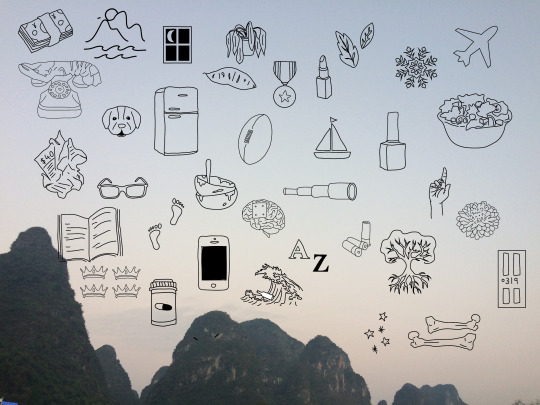
0 notes
Audio
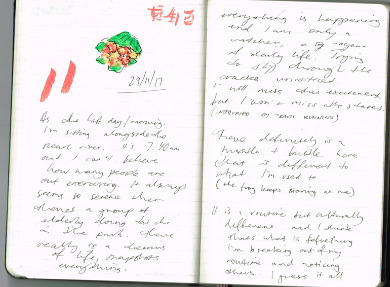
29/11/17
“It’s the last day/morning. I’m sitting alongside the pearl river. It’s 7:40am and I can’t believe how many people are out exercising. It always seems so serene when theres a group of elderly doing Tai Chi in the park. From here I can see everyone. Everything is happening and I am only a watcher, a voyeur of daily life. Trying to sift through the cracks unnoticed. I will miss this excitement but I won’t miss the stares. ((Interrupted by Travis running past and saying good morning)). There definitely is a hustle and bustle here that is different to what I’m used to ((the frog that is near my foot is staring at me (yes a real frog) )).
It is a routine but culturally different and I think thats what is refreshing. I’m breaking out of my routine and noticing others. I guess it all relates to that step back mentality. I never thought I followed a routine but it’s hard not to adhere to time concepts. I think it’s a matter of planning some time in your routine to not do anything or not follow the routine... or does that defeat the purpose.
I’m not looking forward to forcing myself back into my old routine when I get home. Plus it will be December and I’ll start working full time in the Christmas rush. Maybe it’ll feel like I was never here. Maybe this will be a blur, I’ll still be questioning my time in China, having to look at pictures for confirmation. Hopefully these words serve as a good reminder.”
The audio is from my morning alongside the river. It captures the music, sounds and language that I was often surrounded by. It sums up what my ears experienced while in China, a jumble of everything.
0 notes
Text
I never liked Chinese food (until I went to China)
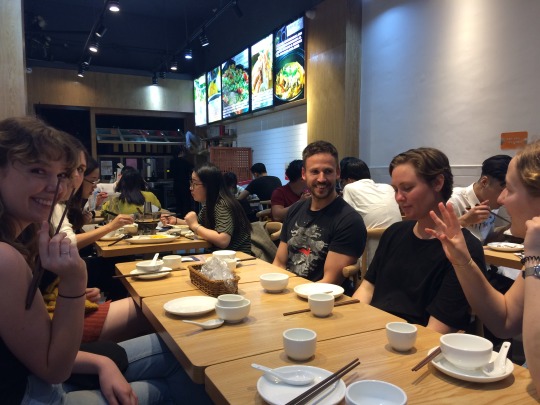
This is somewhat of a follow up post to one of my first posts I made: “a list of my worries while travelling in China”. I expressed in the post that I was afraid of spice. China did not change this, I still hate spice. I’ll probably continue to be that person who asks “is it spicy?” “how spicy? On a scale of 1 to 10”. However I formed a new bond while on the study tour, and it wasn’t just with my classmates. It was with Chinese food.
After doing my research and talking to a few people who were familiar with the Guangdong region, I was assured that there was limited spice where we were going. This turned out to be true, but I still had some interesting experiences along the way.
It turns out that cooking for yourself at home is not really a thing. Because food is so cheap, everyone (especially students) eat out. I was completely on board for this as I prefer eating to cooking. Here is my experience with Chinese food broken into meals of the day.
Breakfast
One of my favourite things in the world is buffet breakfasts. It is just amazing. I can never get over the fact that food just keeps on coming and you can just keep on eating. We were lucky enough to have a buffet breakfast every morning of the trip. It began in the Kaifeng Hotel, where it was a little fancy and a nice balance between new and intriguing to familiar and filling. I laughed every time I saw Georgie pile popcorn chicken on to her plate, nothing could get in her way. In Yangshuo the breakfast was smaller but just as good. A common theme was friend noodles and some veggies. I think I ate my weight in french toast here as well.
Lunch
The first lunch we went to was eventful. Taylah, Georgie, Jess and I were walking down the closest main street to the hotel in search for food. There were some stairs that led to a dim sum place. We were very optimistic and hadn’t encountered many problems or language barriers. The restaurant was full as well which is always a good sign. However no one, absolutely no one spoke English. I think everyone there was at least over 50. Nevertheless we just nodded a lot and pointed some more and some food arrived. We went for the meals that had pictures and ones with the chef hat next to it to signal that this was a favourite (that’s what our theory was anyway). This was going well until I suggested that we try something random. “117 looks good” I joked, but we still ordered it, just pointing to the number. It came out and it was definitely some sort of intestine. My conclusion was extremely chewy, but not too bad. We then proceeded to accidentally short change them and walk out, only to have some staff yell and run after us. We all felt horrible... but full. Our pointing and random dishes didn’t stop there. It extended into the first few dinners as well, until someone befriended a Chinese Student to translate.
Dinner
I went out to dinner with two of my students, Alice and Young. I had spent the afternoon with Alice and we decided that Young should be the one to pick the restaurant. She explained to me while we were walking to the restaurant that she isn’t from Guangzhou and is from a region that had spicier food than Sichuan cuisine. For some reason this didn’t register much with me and we ended up in a quaint and quiet restaurant eating veggie hot pots. The dishes were larger than my face, and much bigger than what I could consume. However I tried my hardest and really went for it (even though I couldn’t grab the noodles with my chopsticks for a good 5 minutes). It was on the third mouthful that I realised how ridiculously spicy the hotpot actually was and I began to profusely sweat. I can deal with sweat but the thing is whenever I eat something hot like a soup, any kind of soup, I get a runny nose. I call it soup nose. Well in the middle of this empty restaurant my nose was dripping, my face was dripping and there was no complimentary tea which really through me off. I ended up finishing the last swig of water from my backpack and had to keep eating. I didn’t want to be rude! I had seen enough cultural videos to see how I could easily offend my new friends, however they seemed to be having a bit of a laugh at my expense. Young couldn’t believe that it was spicy, she couldn’t taste any spice! Alice just thought it was too salty. It was so interesting to see that the same meal could be so different for each of us.
It’s hard to just write about one dinner, because I ate my weight ten times over in food. It was insane how much I packed in, even I’m surprised. But one of the best ways to get to know a culture is through the food. As Georgie said in her post, “I found that when we share food we are more inclined to share ourselves.” I couldn’t sum it up any better myself, because thats what a good meal is. A shared meal and a shared conversation.
BONUS ROUND: Snacks
One of my favourite things to do when travelling is to try new snacks. I go into 7/11 or something similar and I spend big. My snack of choice this study tour... Orion Pies. I describe it as a soft Wagon Wheel but with cake mixture inside but no jam. I think I ate about 3 or 4 a day alongside Taylah. Other snacks include 3+2 biscuits (3 small biscuits, one chocolate layer, one vanilla layer), which I consumed so much of on the plane home because it is the only thing I could afford at the airport.
Overall I miss the food. As I stated I never like Chinese food. I avoid the only Chinese Restaurant in my town. (Mostly due to that fact I used to mess with their chalkboard menu while waiting for the bus and I was afraid they would remember me 7 years later). However, I’ve been told that there are some magnificent Chinese places in CBD, which I’m excited to explore. It’s as if going to China has opened this whole new world to food, friends and culture that I was previously naive about. In the future I hope to continue with aspects of the Cantonese meal - lots of sharing, lots of eating. Maybe not cleaning my bowl in tea before eating, but it might happen. Also still waiting to hear what the Chinese word for lazy susan is.
(Picture taken at Taylah’s birthday dinner at a Thai/Chinese restaurant that quickly became my favourite)
0 notes
Photo
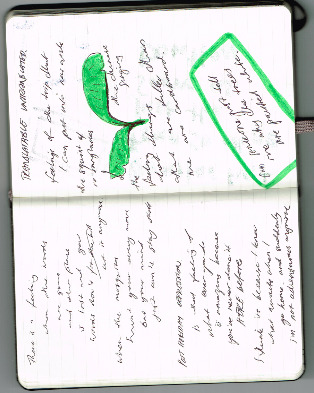

my black moleskine comes everywhere with me
I think it’s obvious by now that I like to write. But the thing is I’ve always struggled with writing spontaneously. I am always so impressed when classmates produce such eloquent work in a matter of minutes, but I have never been one of them. I take my time and I work alone. That’s my sweet spot. However, I never struggle when I’m journalling. Maybe journalling is the wrong word. I never struggle when I’m free writing in a journal. The past few holidays I’ve been on, I’ve taken an A6 black moleskine journal with me. It features to do lists, chunky illustrations, memories and scrawly handwriting. But the most recent entries are from China. They are very messy and fragmentary but in a way I think it represents my thought processes on the trip and how I dealt with cultural differences and altering my expectations.
“China has been different, different but better than I thought. The people especially. The food and the peacefulness. Maybe I’m imagining this but if feels as if China (or just the areas I’ve been to) have mastered the art of overpopulation but also cohesively existing”
“I have a reoccurring nightmare while I’ve been in china and it is always mosquitos. I always feel like I’m being bitten even though I know (mostly) that I’ll be fine”
“Censorship (shut up and write) - am I censoring my actions and the way I speak? I think i definitely am among the Chinese. I’m trying not to offend, but does that mean I’m presenting a false version of myself. Am I censoring myself in front of my peers?”
“What is it about being near water that attracts masses of people. What is it people like about foreign music. Is it the sound, the musicality, a poem without words, a song without lyrics (thats a bit cliche). Does it devoid all meaning if you can’t understand what is being said. Is it like that time I tried to read Rilke without knowing German and tried to focus solely on the sounds I thought I could say”
“There is a feeling when the words are gone and the place is lost and your words don’t fit the bill cut it anymore / when the mosquitos haunt your every move but your mind just can’t stay still”
“That feeling of what ever you do is amazing because you’ve never done it HERE before (eg. I’ve never drank cucumber juice in China before, this is amazing ((even though it was actually a little gross)) )”
“Translatable untranslated: feelings of the trip that I have trouble putting into words. The squint of no sunglasses. The Chinese mountain song singing. The feeling that all the things that are taller are me are made out of cardboard.”
“Can someone just tell me why the trees are painted white?”
0 notes
Photo
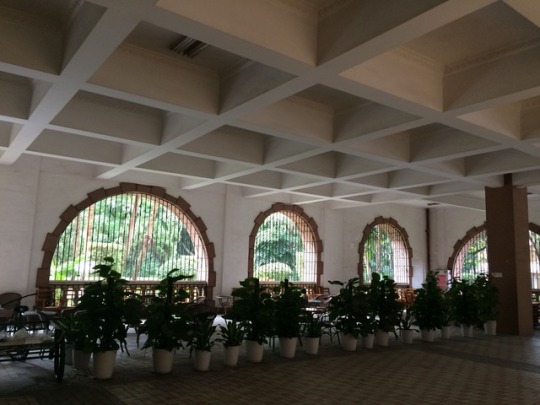


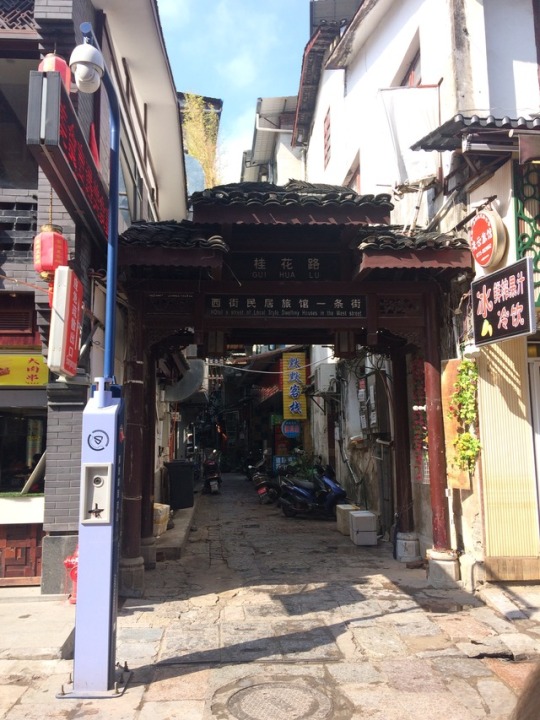
1. School of Foreign Languages
2. River at Yangshuo
3. Light lined street, West St, Yangshuo
4. Street opposite ceramic store where I spent most of my money
0 notes
Text
Putting Thoughts into Words

This semester has been an ordeal. It has been the equivalent to a 4 year olds birthday party where everyone is trying to get cake at the same time, or at least thats how I’ve felt. But at the moment there are 0 days to go and I’m waiting at gate 5 for the flight to board and I’m now worried about deep vein thrombosis and mosquitos but its too late and its probably for the best that my luggage has been checked in. I’ve also realised I packed way too many clothes due to only packing this morning. And my train never came so my sister had to drive me. And Georgie, Jess and I got separated due to an extra baby on the flight. And i’m wearing very uncomfortable pants for an 8 1/2 hour flight. But all in all I’m excited.
The semester has been full on and this trip has been looming in November, but its here and we are in transit. I always have that feeling while at the airport that I’ve forgotten something and its in full force now. However I am reminding myself that we have done a lot of preparation over the semester. From all the information about saving face down to what kind of culture shock we might be feeling. So in a way I’ve been preparing all semester, in fact since the study tour was announced.
As Francesca said in one of her emails this blog is ‘about capturing ideas before they are enacted, and about reflecting back on what you have learned and your experience to date’. I’ve been quite casual with my blog posts. Its been a nice place to express my thoughts and not have to worry to much about the structure. Maybe thats a bit of a metaphor for this trip, not to worry to much about the structure.... maybe its a bit of a stretch.
0 notes
Text
That Time I Was Afraid of Australian Authors

I was 12 when I decided I didn’t like reading ‘Australian’ novels. I was studying Blueback by Tim Winton and my teacher made a huge deal about Winton being Australian and it just annoyed me so much that I just disliked the book (I’m sure it is really good, no hate Tim Winton, I was just 12 and angsty). From there I read The Story of Tom Brennan and all those very Australian mandatory school books. Then in 2013 I read Pictures of Lily by Paige Toon (so painfully Australian) and in 2014 I received an advanced readers copy of The Natural Way of Things by Charlotte Wood. The first page had the word ‘durrie’ and I stopped reading and cut off my relationship with any Australian authors. I thought that all contemporary Australian writing had to try harder than the rest, and the way most authors (I had read) did this, was by making the story SO Australian that the reader couldn’t mistake it for being written by an American or British author. When I went into bookshops I would avoid the Australian section and if I read a blurb that stated the story was set in Australia I would IMMEDIATELY put it back down.
You’ll be happy that I’ve progressed since those days, and honestly so am I. It seemed to click that I was an Australian writer and I would hate if someone immediately dismissed my work purely due to where I was from. So here is me commemorating all the great Australian writing I have read and telling everyone to never judge a book based on its setting.
(In no particular order) Here are a few of my favourite Australian books that are either set in Australia or are written by an Australian:
The Museum of Words: a memoir of language, writing, and mortality by Georgia Blain
This is one of my most recently read and I couldn’t recommend it more. This memoir is so doused with knowledge and beautiful ideas. The author, Georgia Blain was diagnosed with a tumour sitting right in the language centre of her brain. The book is her thoughts as the tumour progresses. She tries to rebuild her language and her lifestyle but at the same time her mother is struggling with Alzheimers. On top of that one of Georgia’s best friends and mentor is diagnosed with the same brain tumour. All three of them are writers.
“The Museum of Words is a meditation on writing, reading, first words and last words, picking up thread after thread as it builds on each story to become a much larger narrative. This idiosyncratic and deeply personal memoir is a writer’s take on how language shapes us, and how often we take it for granted — until we are in danger of losing it.” (Taken from blurb)
This book does not focus on tumours and the struggle of life, but frames a certain type of struggle. At the core of this book is the question of how important is communication (spoiler: very important) and what it means to lose your words as a writer.
Life in Ten Houses by Sonya Hartnett
I’ve written about this book quite a few times for essays and such but I don’t ever regret re-reading this short memoir. My sister bought this for my birthday one year and I read it a couple months before moving to Melbourne. She thought it might give me some insight into the surrounding suburbs of Melbourne. Hartnett writes about the ten houses she has lived in and how these connections with different spaces inform her work and personal life. The book is only 54 pages but has the weight of full length novel. She questions her ambitions as a writer and mediates on how life is often in the way of her work, which I believe happens to a lot of us.
“Acclaimed author Sonya Hartnett is firmly Melburnian but has restlessly moved from suburb to suburb in her search for the 'Last House' – that special corner of the world in which to settle and find contentment. Viewing her life and work through the lens of real estate, she vividly recalls the places she has passed through on her way to finding home.” (Taken from blurb)
The Messenger by Markus Zusak
Whenever I ask people if they have read this book, most say no but admit that they have read The Book Thief. Which I find interesting because from my perspective this book is far more ‘approachable’. I read this a long while ago but I still think about it and this is a telling of a good book. I’ve already mentioned my love for reading peoples stories and I think this is where it began.
“Meet Ed Kennedy - cab driving prodigy, pathetic card player and useless at sex. He lives in a suburban shack, shares coffee with his dog, the Doorman, and he's in nervous love with Audrey. His life is one of peaceful routine and incompetence - until he inadvertently stops a bank robbery.
That's when the first Ace turns up.
That's when Ed becomes the messenger.
Chosen to care, he makes his way through town, helping and hurting (where necessary) until only one question remains. Who's behind Ed's mission?
The Messenger, by the highly acclaimed author Markus Zusak, is a cryptic journey filled with laughter, fists and love.” (Taken from blurb)
Honourable mentions include The Light Between Oceans by M.L Stedman - I don’t know why I enjoyed this book so much but it was just a good Australian story.. never thought I would hear myself say that. I think the lesson here is to try a little bit of everything, which is coincidentally good self advice for the China trip. Maybe one day I will revisit Tim Winton’s work and all the books that I once turned down, I’m slowly getting there.
(picture of my book haul 5 years ago, I’ve only read 2.5 out of all of them.. so far ((books pictured are not the Australian authors)) )
0 notes
Text
Preparation: is it essential?
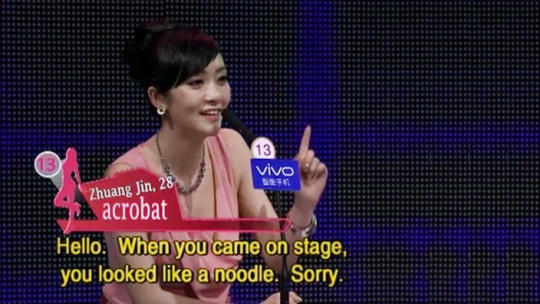
There isn’t long until we leave for China and I can’t help but feel like I am overwhelmed and underprepared. But I don’t think I am alone, I think most of the class are feeling the anxieties of travel creeping in.
I’ve got my Visa and the flights are booked but there are still plenty of things to do before I go. But somehow I’ve made time for some pop culture prep, which I am still yet to figure out if it is helping or not. I’ve been watching SBS’s If You Are The One, a Chinese dating show that has an audience of up to 50 million per episode! So i’m definitely not alone here.
The show consists of a lone male suitor, who has to impress a panel of 24 single women, who can then register their interest or disinterest in the man through the use of their podium lights. They get to show pre-made videos about themselves as well as have friends or family vouch for their character. Now here is what I’ve gathered from the show (which isn’t much)
A lot of guys sing, whether they can or not
If you show a female in your videos, most girls will turn off their lights
The translators from SBS have a lot of fun
If the suitors don’t get picked, you can email them and apply for a date.

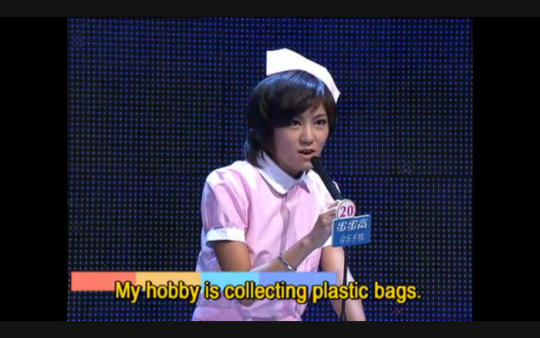

I know I’m procrastinating getting organised and doing REAL preparation for the study tour. But watching the show counts for something right?
Photos from http://www.sbs.com.au/popasia
0 notes
Text
My Love for Lists
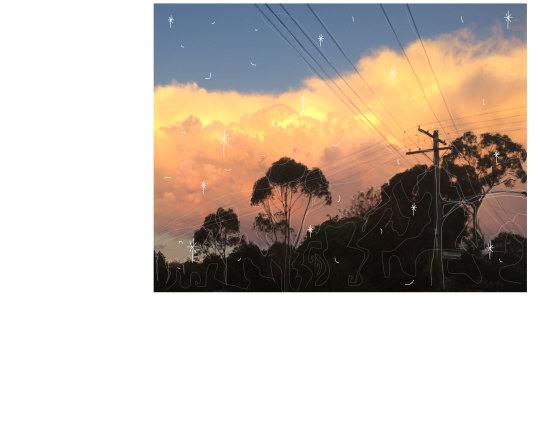
There are only 12 days till we leave and a lot can happen in 12 days.
In the past 12 days:
I worked 40 hours when I was only rostered for 8
My Grandpa had a small stroke and we don’t know whats going to happen
3 elderly couples told me their family history while I was making copies of their photographs from 60 years ago
I slept a lot
I listened to many people complain about self serve checkouts
I went to another acoustic music gig with just with my dad
My dad decided to go to Canada to surprise his aunty for her 90th birthday
I read two novels
My car broke down again
I finished season 6 of Suits and binge watched Stranger Things 2
I petted my boyfriends dogs a lot
But when you write it down in a list sometimes it doesn’t feel as much or as overwhelming. Maybe this is why I write so many lists.
(photo of sunset cloud while going for a walk in Balnarring)
0 notes
Text
The Three C’s

I wasn’t sure what to expect when undertaking this studio, my initial approach was to understand a different culture through creative writing. However, I feel this only skims the surface. What we are doing with these anthologies is not just showcasing intercultural writing but impacting our understanding of how to connect and communicate with others through creative writing. In the beginning I thought writing was at the heart of this collaboration but upon reflection, the core of this studio has developed into the connections we make with the students in China.
0 notes
Text
Xiang 想: Blog Digest

Xiang 想: to glide or to float. Under this definition we named our group, with no knowledge of how it would develop into broader ideas and themes. And yet, looking through the blogs we have created, we realised they make up a collage of work that reflects this very word.
Shona’s blog, #RMITOUTBOUND, is a collection of informative writing, frequently based on self-experience. She references texts, facts and ideas that are entrenched in Chinese culture, from Asian cinema to the value of fossilised teeth in China, to the development of ancient Confucian ethics in the modern world.
Jess, like Shona, is fascinated by Chinese culture – particularly, Chinese and Asian-related literature. On her blog, The Literary Wanderer, she has compiled an entire ‘China reading list’ series with this in mind. She also has a simultaneous series ‘Lesson #’, where she summarises helpful tips for writing and editing, from class discussions to personal observations.
Ashlea’s blog, Take Me Away, explores her progress as an editor, realising the obstacles of language differences and social vulnerability that comes hand-in-hand with intercultural collaboration. Her posts are often angled inwards, as she reflects on fears attached with travelling – namely leaving her dog behind – and the search for vegan food in China.
Pallavi’s blog, The Backpack Traveller, considers the notion of travel and how it affects her writing. From quick guides to Guangzhou and Yangshuo, to trains of thought, she is interested by the idea of learning about herself and the world through travel.
Finally, Lisa is fascinated by intercultural themes, including culture research and intercultural collaboration. Her blog, With Your Words, shares her research in a personal, inclusive way – for example, sharing anecdotes and her ‘hate/hate relationship with spice’.
Driven by examples from Francesca’s blog inside/outside, we have written about Chinese culture, travel, writing and editing Chinese work, anxiety, and fascination. Overall, our collection of blogs is a telling portrait of our group name, as we float between these topics in preparation for the study tour.

Shona’s reflections on intercultural writing and editing constantly refers back to personal experience, whether it’s dental work, the origins of her mixed-race (Chinese/Irish) name, films or the perils of group assessments. Her stream of consciousness approach weaves in and out of the blog’s topic, much like the nature of casual conversation, and oftentimes it’s the side stories and anecdotes that is engaging. I think it’s safe to say that we mentally glaze when reading another post about the upcoming trip to China… but did you know fossilized teeth are considered highly valuable and ground down as a kind of medicine in China? That Chinese deities are typically not intrinsically immortal, but eat magical peaches or pills in order to live a long time, sometimes forever, sometimes only a thousand years? I didn’t. Now that’s got me interested to read on.

Shona’s blog makes an effort to be inclusive and informative. Her blog-digest post contains a screenshot of all eighteen blogs, and when you click on the blog’s image it zooms and displays a brief summary of her thoughts on it. The time and care Shona has taken to do this is impressive, and demonstrates her dedication to the trip and her consideration for the students in the class. Go on, follow the link and see what she has to say about you…
Her blog is also a resource for discovering more about Sun Yat-sen University’s Creative Writing program and Professor Dai Fan that Francesca admires and speaks very highly of. So, if you are curious to find out about the university and their bilingual Creative Writing program, check it out?

If I could only choose one word to describe Jess’s blog, it would be professional. Followed closely by cohesive, knowledgeable, and fan-bloody-tastic. Jess’s blog is a comprehensive guide to both editing and all things literary (well, almost all things. Mainly Chinese literature, really). What’s unique about Jess’s blog – which is beautifully and fittingly titled “the literary wanderer” – is that she reviews the books that she has read, as well as any books written by Chinese authors or are a part of Chinese literature. You can find an example of one of her reviews here.

Jess’s blog is neat and tidy; everything is easily accessible and readily available at the click of a button. The simple yet sophisticated layout makes for a very professional feel. This makes navigation a breeze. Besides her reviews, Jess also talks of her struggle in writing race, and how being biracial herself impacts her own writing. She grapples with not knowing just how much authority she has on the issue and resolves to try and discover this as the weeks progress.

Travelling in a new country is exciting but also disquieting. When you combine pre-departure planning, long flights and dietary requirements, it can become overwhelming. But as Ashlea states in her blog, there are eighteen of us with many feeling the same. Ashlea’s blog confronts her anxieties about the China collaboration. Her blog drifts from personal contemplations to honest insights, while being soft and inviting – a comfortable place for both herself and her readers.

Ashlea shares her fears about travelling and worries about leaving behind her German Shepard puppy and her two-year-old baby sister (see adorable puppy photos here). There is some apprehension in her writing, as she questions her own content but concludes that ultimately her thoughts and feelings are what make up her blog. Her writing is casual and similar to a diary entry, but also provokes thought as she shares her progress as an editor. In her post ‘edit: I barely know what I’m doing’, Ashlea reflects on editing work that is in an author’s second language, expressing that ‘there will be a lot of vulnerability involved’. She sums up the anxieties of writing stating that there always is vulnerability involved when you share a piece of writing, as it is an extension of yourself. Ashlea’s words echo what many students are contemplating, as her reflections provide the class with an honest understanding of how challenging but exhilarating the whole experience is.

In writing and designing her blog, Pallavi seems to have considered a mixture of practical advice and artistic expression. This means she has included valuable information about our destination, the unit’s activities and a self-introduction. But she also includes a piece of poetry, something I regard as a brave and unexpected choice, as well as a painting she did by herself.
I consider her ‘five-minute guide’ on Guangzhou to be a must-read for anyone going to China. She includes all the basic things a person should know before going, things I wish I had known before I went there. For example, it’s vital for everyone to know you must never drink Chinese tap water.
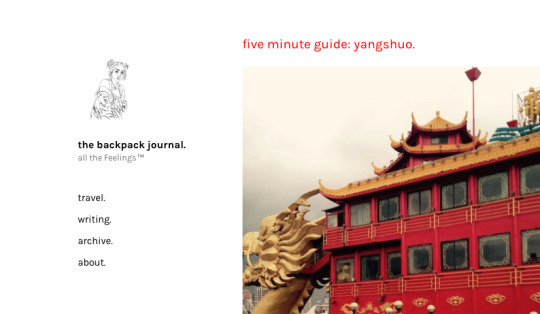
One particularly charming post describes her thoughts on travel. She includes a story about learning how to drive a manual vehicle, and from there the post flows into being about her tendency to overthink and how it causes her anxiety. But she doesn’t say this of herself. Instead, she describes a psychic saying this about her. The implication is a perspective where it isn’t enough for her to express a view. Rather, she wants to tell us why she thinks what she does, and the result is that we get a tiny peek into her world and her mind than simply getting her own opinion about herself – though we get this too. Pallavi’s blog is a worthwhile viewing as a study into how practical a personal a blog can be.

The first thing you’ll notice when you click onto Lisa’s blog is the to-the-day countdown, greeting you at the top of the page. Her posts are a collective follow-up to this number, as she prepares for China – from considering the language to her food fears. Her uncertainties stemming from travel are often soothed by the research she conducts, yet her writing is never dry. She maintains an informal tone, ranging from conversational to journalistic. In an average post, the reader experiences Lisa’s internal journey: intrigue, uncertainty, then knowledge about said uncertainties, and finally, reassurance that despite these things, it will be alright in the end.
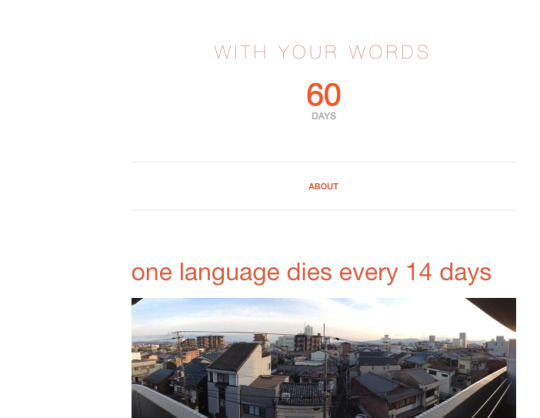
While Lisa primarily explores intercultural themes such as culture shock, intercultural collaboration, and language research, two of her posts deviate from this central notion. In particular, her post ‘one second’ is a collage of thoughts that are linked by the importance and preservation of stories. The reader feels as though she is sharing pages of her journal; in one part she writes, ‘My mum and I were driving back to the caravan park after walking through rainforests together and I said, have you thought about writing your life story down?’ Each segment of the post comes back to this sentiment. In a way, we can look at Lisa’s whole blog as documentation of her story about China.
Though her words have been carefully edited and researched, Lisa’s blog is contemplative, preparative, and most importantly, a story that is enjoyable to read.
In reading each other's blogs, we have a chance to learn more about China, the tour and each other. While we each have unique perspectives, all our writing appears to be reflective. By writing honestly, we are able to share our inner voice with a degree of authenticity that no other form of expression lends. But these are also living documents. As we write, we can look back and observe the way we grow as the project progresses. Each of us will react to the experience differently. At the moment, we all share anxieties of travel but are intrigued at the connections we will make. By the end of this project, we will have an excellent record of the achievements, lessons and memories made in China. From pre-departure thoughts, to contemplations while in China and final reflections once we return home, we will continue to glide and float through our collective reflections and grow closer as a team.
0 notes
Text
one language dies every 14 days

I remember when I was about eight, I said that I wanted to learn every language that existed. At a young age this seemed like an appropriate goal, however I now know that this dream is almost impossible, as there are a vast amount of languages that the western world don’t know about. There are tribes that have evolved their own language and some I just don’t have that much of an interest in learning (Russian??). So I altered my goal, I hope to be at least bilingual, but that presents its own problems. Which language do I choose when there are so many out there. I briefly talked about my relationship with languages in my first post but I wanted to talk about it more in depth.
INDONESIAN
I was doing quite well in Indonesian while in high school but soon came to the conclusion that I wasn’t going to spend a lot of my time in Indonesia. I dropped out of the class but promised I’d keep practicing (which didn’t happen). Now I only remember one line that a guy in my class made into a song ‘kakak laki-laki lebih suka makan kubis’.
DUTCH
My dad’s side of the family is Dutch and I’ve been trying to pick up the language for a long time. I am always trying to prove to my cousins that I can say my last name correctly, but the throat noises don’t come naturally. I struggle a lot with the g’s. I was at a house party in Edam with a cousin and some friends and someone asked me if I could speak Dutch, I said a little bit (in English). He asked me if I could say ‘geen’ and I replied with what I thought was a good amount of throatiness and accent. He laughed and said it didn’t sound anything like it. Here is when I realised that Dutch is a lot harder than I thought, even though elements of the language are similar to English. I am persistently learning Dutch, but it is a slow burning relationship.
SPANISH
This year I started learning Spanish as my ‘gateway language’. I’ve heard rumours that if you learn one European language, you can learn the rest quite easily. I can’t sing ‘Despacito’ fluently but I am proud with how quickly I’m picking up the language. Although I don’t think I’ll be capable of understanding any native Spanish speakers as they speak fast, with all the words blending into one syllable.
ENGLISH
My favourite conversation to have with strangers is about language and writing. One of my Chinese students and I have been having conversations about our hometowns, our writing and what we hope to do in the future. A few days ago she asked me to explain some grammar to her. The sentence was ‘the water is a beautiful aqua-blue’ and she asked why we used an ‘a’ in the sentence. My explanation was messy and nonsensical but she replied, gushing that my explanation was ‘so cool’ and that she had a totally new understanding on the usage of adjectives. In the past I’ve always learnt languages alone, or not really generated conversation around it. Even though we won’t be learning Chinese, we are still able to help our students with their English and thats really exciting.
BONUS STUFF
I read recently that one language dies every 14 days (interesting article by Nat Geo here). I don’t know what to make of it but it is intriguing, maybe I should learn Latin, or maybe even a more ‘dead’ language, how dead can a language get before it is extinct??
To end on a more fun note here is a website where you can test how good you are at recognising languages - Great Language Game.
(photo from hotel in Kyoto, Japan, where I tried to learn basic Japanese. It was so sweet to see locals excited over my wrong pronunciations, but language is all about trying right?)
0 notes
